In all possibility, you may think that when it comes to Richard Allen and the New English Library Skinhead titles there’s little more to be said, almost 50 years on. And like the steel-toed kick in the balls you’d clearly deserve, you’d be wrong, very wrong. Mark Sargeant (Sarge) has written for Scootering since the 80s – many post-decimal currency readers wouldn’t even know the name Richard Allen without the contribution of his spadework in bringing Skinhead to a new audience during that period.
Sarge was kind enough to put away his toolbox and answer a few questions on ‘The Richard Allen Legacy’, his late 80s Scootering interview with the author himself and life as a rally-going soul DJ.
When did you first come across the Richard Allen books?
At school. Skinheads were morphing into suedeheads at the time, it was a mixed grammar school, with quite a strict policy on uniform and colours of uniform. Those of us with a rebellious streak pushed the boundaries with button-down Ben Sherman, or Jaytex Oxford cotton shirts or white Fred Perry polo shirts with black, grey or even navy blue sta-press and black Doc Marten or brogue shoes. Later Brutus jumbo collar shirts and certain combinations of tonic sta-press were favoured by those of us in the know, of course, navy blue or black Crombie coats were worn to and from school. Instead of being sent home for hair being too long, quite a few lads were sent home until their hair grew. New English Library put out Skinhead by Richard Allen, which followed the exploits of East End skinhead Joe Hawkins.
I got my copies of Skinhead and Suedehead from WHSmith in Oxford city centre, in fact, I got most of my Richard Allen books from there, and still have those copies today. Some schoolmates would’ve found themselves in trouble at home if they dared to take a copy there, so well-thumbed dog-eared copies of Skinhead, and soon after Suedehead were passed around in a similarly furtive way as soft porn magazines. Some copies of Skinhead and Suedehead were confiscated by school teachers, who probably wanted a sneaky read themselves. Those with grebo inclinations had their own similar books such as Chopper also published by New English Library.
One lad in my year selected to read a chapter from Skinhead in a public reading/speaking competition held at the school. Despite several Anglo-Saxon words included in his chosen chapter, the subject of which was football violence, he more or less pulled it off, apart from a minor admonishment by the head of English, for sniggering while reading out loud a line about Joe Hawkins kicking some random opponent in the balls! Cult fiction like Richard Allen books tapped into the impressionable teenage market of the very early 70s, way before the internet, mobile phones and social media. Suedehead sales went into the millions, which literally saved New English Library from going bust.
Were you still a skinhead in the late 80s when you were at Scootering and beginning to write about the books or more of a scooterboy by then?
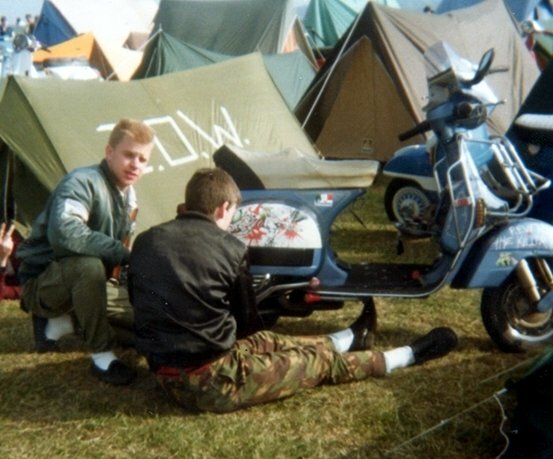
More of a scooterboy/soulie, though always have had a leaning towards the original skinhead/suedehead era. Interesting times… Oxford Roadrunners had mods, scooterboys, scooter skins, soulboys, punks and psychobillies as members, with no cultural differences as scoots were what brought us all together.
The problem was, I think, uber-elitist mods in the early 80s pushed the more Quadrophenia-inspired away, scooter boys were on the rise, riding serious distances on scoots led to practicalities in the attire stakes. Also while many arrived via mod/Quadrophenia, it soon became an insult to be dubbed a mod, scooter boys were in effect anti-mod in appearance… yet underneath shared a similarly wide taste in music.
Personally, I went from a young skinhead/suedehead and later bootboy eras into soul, with a brief dip into early punk, both northern soul going to Wigan Casino events as well as funk/jazz funk Rio Didcot, Lacy Lady and Goldmine down near Canvey Island among others. Then the mod revival reawakened my interest in scoots, having learned to ride Lammys aged 13/14. Mod, skin/suedehead and soulboys/soulies cross-pollinated with each other. I can remember scoots parked up outside Wigan Casino on many an occasion, for example.
What caused you to put pen to paper with ‘The Richard Allen Legacy’ for Scootering?
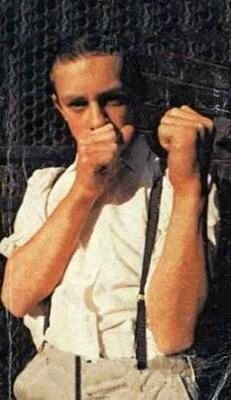
If memory serves, it was initially a broad overview of cult fiction, from Absolute Beginners onwards, that very tenuously included scooters. A loose follow-on to Steve Berry’s overview of scoots featured in big and small screen films. Other books included covered The Death Penalty – I can’t remember the author off the top.of my head – which was about a skinhead/bootboy football crew who after their team gets knocked out of a cup competition, track down the referee who awarded a penalty against them. Set in the early 70s, the referee is eventually chased while out training alone by the ‘heroes’ on their scooters, before being kicked to death. Caleb, a West Indian lad on the periphery of the crew, gets fitted up for the killing.
The Richard Allen Legacy was kind of a natural progression from the initial cult fiction idea. There were a total of 18 books penned by James Moffat as Richard Allen… some better than others, of course. Demo, the first Richard Allen book about/subject of student/hippy protesters was the only book I didn’t get as a new publication. Skinhead, Suedehead, Boot Boys, Smoothies especially and the last Richard Allen book Mod Rule were part of the formative years of two separate generations of the magazine’s readers at that time.
Outside of the novels, there was a fair amount of rucks between those subcultures
There were a few, well more than a few, incidents, stand-offs and the like. That the male of the species has an inbuilt natural desire to defend their turf and invade/conquer others, without getting too sociological, goes back to prehistoric times.
I can remember being at Tiffany’s Great Yarmouth when Desmond Dekker played live and the gig was halted by right-wing boneheads who had planned the disruption. Of course, it was near impossible to differentiate right-wing extremist boneheads and scooter skins there to see a skinhead reggae legend. The, err, boot was on the other foot so to speak, at Margate rally when Col. Kilgore Vietnamese Formation Surf Team played, right-wing boneheads attempted to disrupt that rally gig but ended up getting battered. Isle of Wight rally when several Oi bands played and ended up in a riot culminating in scooters being banned from the island also marked the end of overt infiltration of the scene by right-wing boneheads.
Of course, in the early days of the national rallies locals took exception to their hometowns being invaded by hordes of scooter-riding outsiders, with occasional inevitable culture clashes resulting in scuffles and punch-ups. Riding back from a Bournemouth rally around 1980, a few of Oxford Roadrunners took an unplanned detour which resulted in some local yokel wannabe punks mob-handed in cars attempting to run the scoots and riders off the road. Needless to say, a return visit was paid! Early RSG nights run by Jon Buck in Berkhamsted invariably ended up with mass brawls in the streets with mods, scooterists and soulies against mobbed-up locals. Both incidents being far from unique, similar incidents were rife across the UK from the 60s through to the noughties and beyond.
In general terms, rivalries such as mods and rockers, skinheads and grebos, punks and revival teddy boys, football team local derby matches, and the like have, to lesser or greater degrees, been part of teenage and beyond males’ makeup. To quote Madness, oh what fun we had!
Subcultural rites of passage and a sense of belonging while looking down on and belittling those not a part of your inner circle was for many decades a quasi-tribal part of growing up, certainly in the UK. In recent times the advent of political correctness along with invariably mollycoddling of their young the British middle classes have created a generation of mummy’s snowflakes, the combination of which has all but eradicated the advent of new youth subcultures with tribal undercurrents sadly. Which has led to youngsters with a desire to be different and to rebel against society to discover for themselves subcultures that are decades old, though the influx of young blood does put a contemporary spin on what’s gone before. At least that’s the way I see it.
By the time you wrote that piece Moffat/Allen was largely forgotten about?
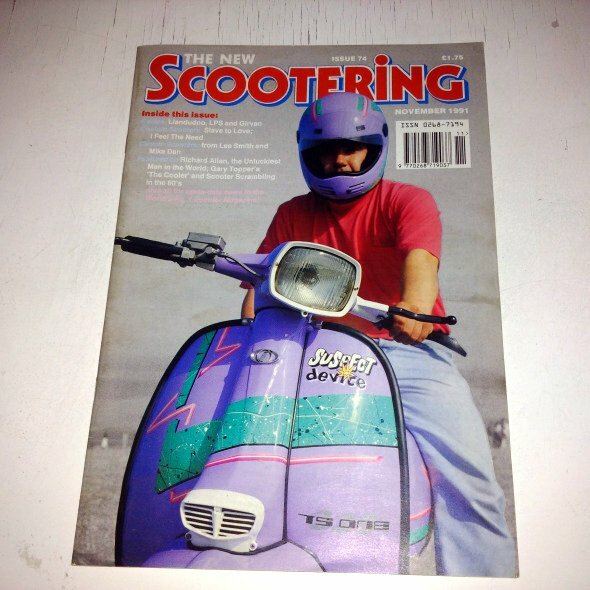
Apparently so. Certain Richard Allen titles were beginning to command £5 even £10 for near-mint first editions from collectors. But yes, in the main, even with Mod Rule being published at the tail-end of the 79 and early 80s revival, Richard Allen books, along with similar cult fiction novels had been forgotten by the mid to late 80s.
Although I didn’t know at the time, James Moffat AKA Richard Allen was not in the best of health, in a care home. I tentatively attempted to get in touch with him (as did a few others with less luck) and I sent a copy of the magazine with The Richard Allen Legacy in it, along with a covering letter to him via New English Library. I believe it was forwarded on to his family, then they forwarded it on to him. He replied by post, he was surprised there was an interest in some of the books he’d written many years before, and pleased with the Richard Allen Legacy piece too. On the back of that he agreed to do an interview (by post), he politely declined meeting in person or speaking on the telephone.
His official reasoning being that he didn’t want to shatter any illusions of how Richard Allen was perceived to be like. The stark reality was he really wasn’t in the best of health and couldn’t guarantee he’d actually be well enough to keep to any time or date schedule. Instead by communicating via letter he could respond as and when he was able. I was in communication via correspondence with him for some time until a few weeks before he passed away. He asked that I didn’t, at the time, reveal that James Moffat was Richard Allen. In fact, all correspondence I received he signed Richard or Richard Allen.
Did the interview have any immediate impact, either by the readership or outside of it?
The magazine had some complimentary comments when it came out. What also transpired as an aside to the interview was James Moffat had retained copyright on his Richard Allen novels. I put James and George Marshall at ST (Skinhead Times) Publishing in touch with each other, the result of which saw ST put out a series of six Richard Allen books, each with three linked titles. For volume one of the series of six James, as Richard Allen, wrote the foreword. Was nice for me to get a namecheck in that. Also, as an aside to the interview, George, just after doing the deal with James for reprinting and represent all 18 Richard Allen titles for several years after published a number of cult fiction books, via ST, alongside his own coffee table-type books on skinheads.
A short while after the interview came out I had a few letters from longtime Richard Allen fans, one who generously sent me a copy of, I think, Marathon Man by James Moffat… it was the book he was challenged to write on live Saturday night magazine programme On The Braden Beat. It was in the run into an Olympics, so topically the Olympic Games were worked into the plot. The challenge was to write and (have it) published as a book in one week/seven days… James managed to complete the challenge with one day to spare! As far as I’m aware that Braden Beat appearance was the only time James or one of the very few times, appeared on television. He was quietly quite proud of that achievement, as he mentioned it several times to me.
What about yourself after that era of Scootering?
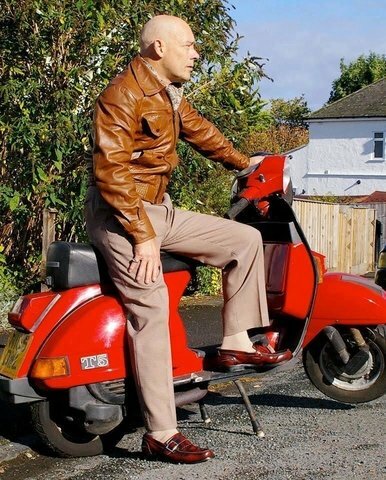
I’ve covered a vast number of feature scooters as well as the occasional rallies, events, scooter sport meetings and custom shows. Also interviewing bands, musicians, live shows, specialist music DJ-driven all-nighters and all-dayers, plus on occasion interviews with authors of books, and even films and plays.
In 2014 I was commissioned to produce an entire supplement for Scootering, ’50 Years of Mod’, as 2014 was the golden jubilee of the then over-reported and sensationalised bank holiday mods and rockers clashes. Though I say so my self it was rather good as it revealed the realities of some of the ‘happenings’ of 1964 from people who were there at the time. Additionally, there was a short overview of subcultures that were, in effect, the bastard sons of the original mods, skinheads/suedeheads, northern soulies and casuals amongst them. As an aside, albeit linked to writing and photography for Scootering I’ve contributed as a researcher/interviewee to a number of books with specific bands, eras, and subcultures as subject matter.
In recent times Scootering editorial policy moved away from the more lifestyle type of features for several years. However, over the past 18 months or so there has been a massive swing back to encompass, embrace and include a wide range of lifestyle, as in music, books, and clothes, subjects in Scootering magazine.
source : CreaseLikeKnives
.png.07dc8c0736c8d08d3fa22fff55ce8889.png)
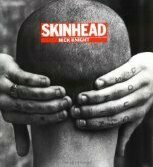
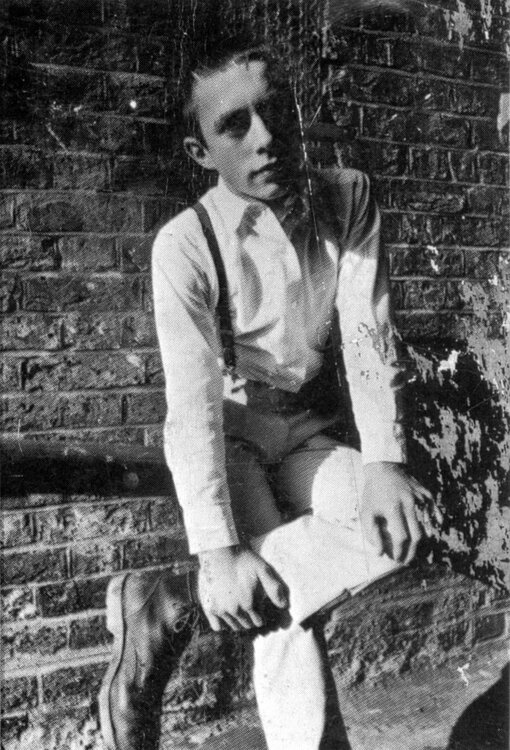
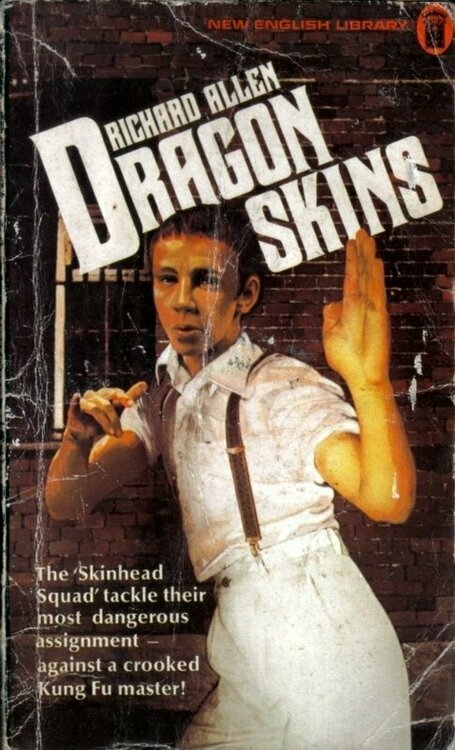



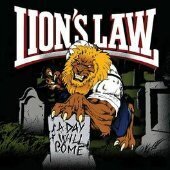

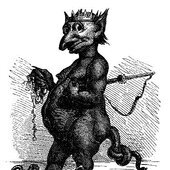











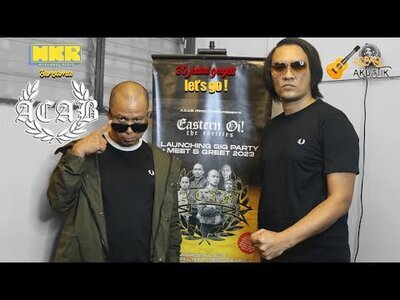

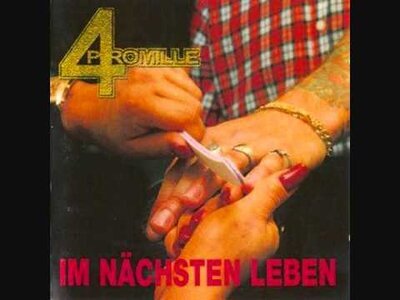

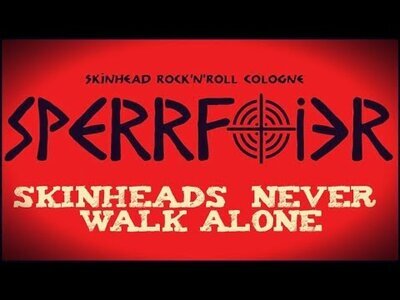
Recommended Comments
There are no comments to display.
Join the conversation
You can post now and register later. If you have an account, sign in now to post with your account.